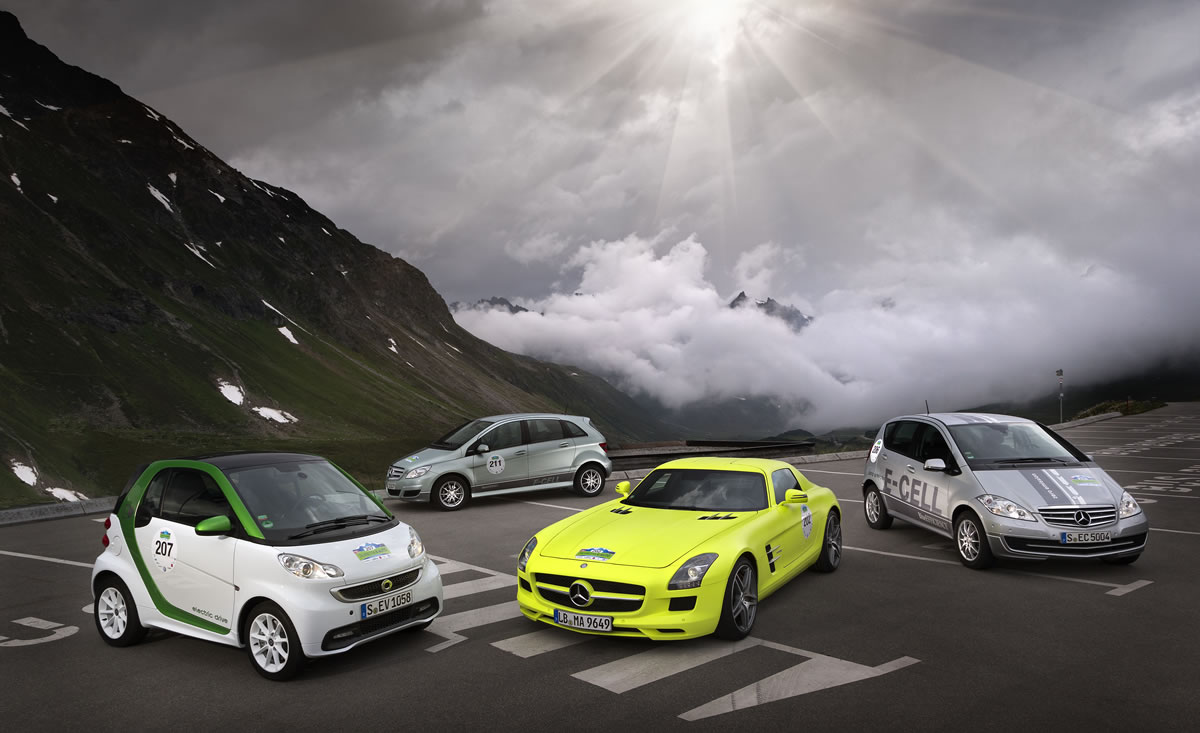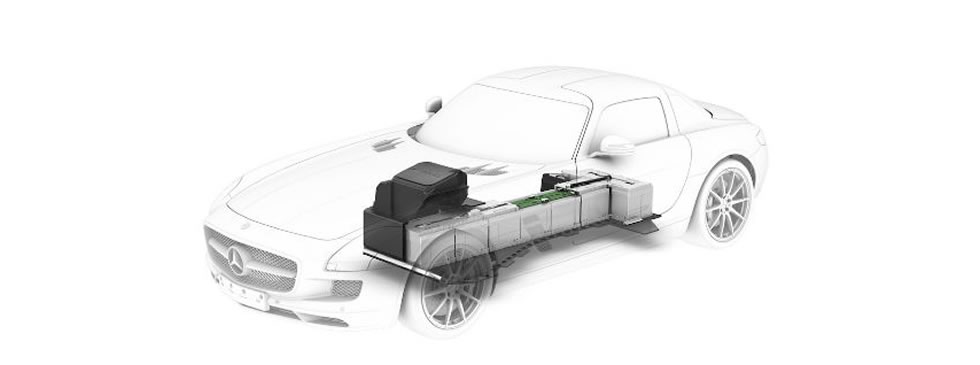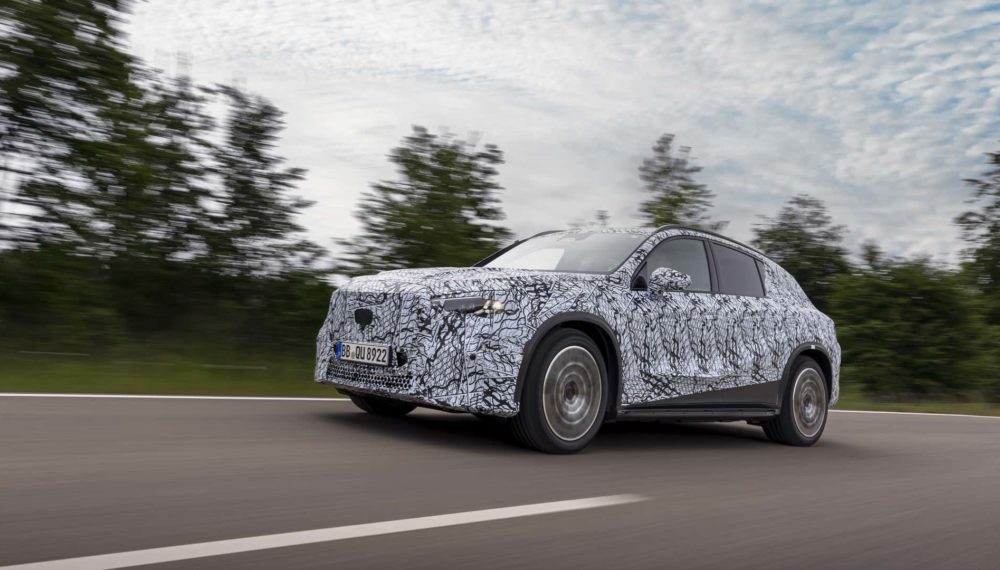The third Silvretta E-Car Rallye in Austria is a stress test for electric cars, hydrogen fuel cell cars and electric motorbikes. The 300-mile, three day course winds up and down the Alpine mountain roads around Montafon, Austria, that include grades of more than 15 degrees.
As in past years, Daimler will again have the most vehicles at the starting line, with a total of seven battery and fuel cell-powered electric cars. The event will take place at Montafon, Austria, from July 5–7 2012. All the Daimler vehicles will cope easily with the tougher conditions of this year’s rallye, including longer distances, large height differentials and even steeper gradients than before. Furthermore, the smart ebike is going to travel parts of the Silvretta rallye route, as well.
For the first time, the Daimler entrants will include two brand-new smart fortwo electric drive cars. This model has been commercially available since mid-June 2012, making Daimler the first German automaker to launch a series-produced all-electric car on the market. They will be competing alongside their tried and proven counterparts: two Mercedes-Benz A-Class E-CELL vehicles, two Mercedes-Benz B-Class F-CELL vehicles and the Mercedes-Benz SLS AMG E-CELL electric super-sports car, scheduled for market launch in 2013. It will be driven by Karl Wendlinger, a former Formula One driver and now an AMG brand ambassador.
Electric cars traversing the Montafon mountains
The three-day rallye through the mountainous landscape of the Montafon area is not a speed contest – instead, the victor will be the driver displaying the greatest degree of uniformity and skill. The overall distance of the course is more than 330 kilometres, around 30 kilometres longer than last year. The sections are also significantly more demanding than before. The task is to negotiate the various sections, including gradients of up to 15.2 percent and height differentials of as much as 4759 metres during a day, with incredible accuracy: the teams are expected to complete a series of trials in exactly the right time, to within a hundredth of a second, with penalties for faster or slower times. And because they are driving silent electric cars with zero local emissions, the competitors will enjoy the added benefits of clear mountain air free of emissions or noise pollution – surely the best possible way to experience the scenic mountain landscape in Austria’s Vorarlberg and Tyrol regions!
Mercedes-Benz and smart electric cars
The third Silvretta E-Car Rallye enables Daimler to showcase the world of future mobility, with its wide spectrum of electric cars powered by batteries or fuel cells, already operating reliably in everyday road transport conditions.
The participation of the new smart fortwo electric drive car in the Silvretta event will show that the new vehicle is now more than a superb inner-city car. Its enhanced power ratings provide more dynamic performance qualities and excellent acceleration, equally useful at traffic lights in Berlin as on a steep climb in the Montafon mountains. Its range of 145 kilometres, maximum power of 55 kW and top speed of 125 km/h make the new smart fortwo electric drive even more fun to drive than its predecessor. It should be noted that the previous model was already an impressive performer, with a range of 135 km, 30 kW output and a top speed of 100 km/h.
The competitors in the e-rallye will again include two Mercedes-Benz A-Class E-CELL cars. This model offers space, flexibility and comfort, all with zero local emissions. Its range of more than 200 kilometres makes it ideal for local emissions-free driving, both in the city and on the open road. It is powered with a quiet, locally emissions-free electric motor with an output of 70 kW (95 hp). The A-Class E-CELL is fully ready for series production, and is already available to selected customers.
Another vehicle is the Mercedes-Benz B-Class F-CELL. This car has already proved its readiness for series production and suitability for everyday use, for example in the F-CELL World Drive event in 2011. The fuel-cell powered vehicle runs on hydrogen, with a 100-kW electric motor offering dynamic performance qualities equivalent to those of a 136-hp, 2.0-litre petrol engine model. The B-Class F-CELL has a range of around 400 kilometres per tank of fuel.
Another highlight back at this year’s event is the Mercedes-Benz SLS AMG E-CELL. The performance of this outstanding concept model over the twists and turns of the Alpine rallye course will prove once and for all that thrilling and dynamic automotive performance can go hand in hand with electric propulsion. The fascinating gullwing design, now with a high-tech emissions-free powerplant developing a maximum output of 392 kW and a maximum torque of 880 newton metres, is the standout pioneer in the super sports car market segment. The man at the wheel of the SLS AMG E-CELL will be well up to the task: as a former Formula One driver and a native-born Austrian, Karl Wendlinger knows all about fast cars and the mountainous route traversed by the Silvretta E-Car Rallye.
Two-wheeled electric mobility with the smart ebike
Not all of the electric vehicles in the Montafon mountains this year will be on four wheels. Daimler will also have the new smart ebike on board, to travel part of the route of the Silvretta E-Car Rallye, up hill and down dale, in tandem with the cars. The new member of the smart family successfully puts the characteristic smart on two wheels: everyday functionality, distinctive smart design and high-tech excellence, as illustrated by the outstandingly powerful and efficient drive concept. The pedelec (pedal electrical cycle) combines the comfort of a motorised bicycle with the ease of handling of a bicycle. These bikes can be operated in EU countries without a driver’s licence or insurance sticker, since the electric motor provides support up to a speed of 25 km/h. The smart ebike is fitted with a 423-Wh lithium-ion battery, and has a continuous power rating of 250 W and a torque of 35 Nm.




